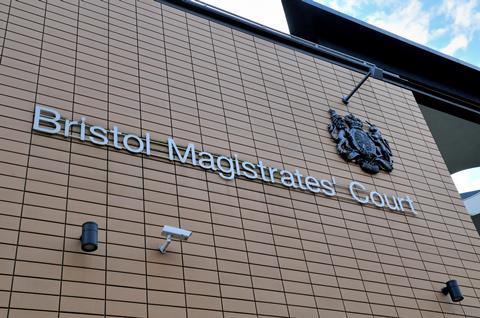Criminal defence solicitors are refusing to enter the cells at Bristol Magistrates’ Court due to safety concerns after Avon and Somerset Police stopped running virtual remand hearings from their custody suites.
The force, which was one of the first to set up and run virtual remand hearings following a request from HM Courts & Tribunals Service in March, informed HMCTS and the Crown Prosecution Service that running the hearings was no longer financially or operationally viable.

Defence solicitors say they now face an ‘unacceptable, unsafe’ system of working. A press release issued by Ian Kelcey, head of crime at Kelcey and Hall, Tony Miles, senior partner at Bobbets Mackan, and Jan Matthews, managing partner of Reeds, says: ‘We recognise that the system that was put in place meant that there were increased resource implications for the police, that however was balanced by increased efficiency in the court process which it is likely to have saved public money overall.’
They say solicitors are being asked to see defendants in very small rooms with chairs chained to the floor in close proximity to each other with poor ventilation. They have to spend long periods of time with the client. The average age of defence solicitors is over 50 thereby placing them at higher risk from Covid-19.
Solicitors do not know the medical history of the clients and have not been provided with any risk assessment. Senior HMCTS management are urged to install Wi-Fi in the cell areas immediately to enable safe remote working.
The Ministry of Justice said it has addressed lawyers’ concerns by setting up a telephone system for lawyers to talk to defendants in 15-minute slots. Facilities have been properly risk assessed and comply with public health guidelines. Rooms being used by legal professionals comply with social distancing measures and are ventilated in accordance with PHE guidance.
The Law Society expressed concern that police forces were stopping virtual remand hearings. David Greene, president, said: 'Forcing defendants, solicitors and other legal professionals to attend court, where they have concerns over social distancing and safety compliance and when they could carry out the same hearings remotely, is an unnecessary risk that they should not be asked to take.
'Moreover, reducing the number of cases heard remotely when health guidelines limit the number of people who can be permitted into a court building will adversely affect the capacity of the courts, and their ability to clear the backlog of cases that has built up.
'We understand police forces are suffering from the same underfunding bedevilling the rest of the justice system and would call for them to be properly resourced to enable virtual remand hearings to continue.'



























5 Readers' comments